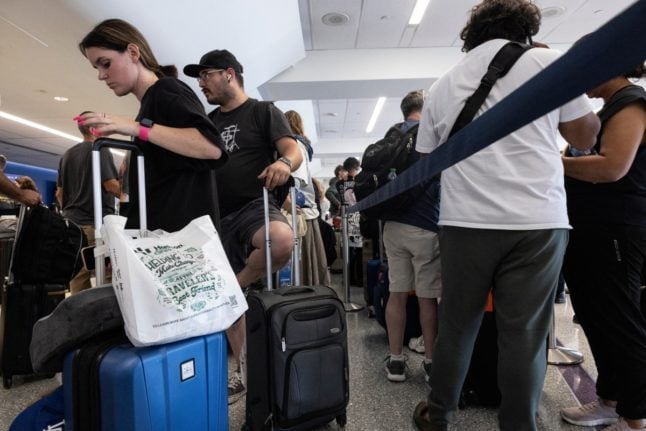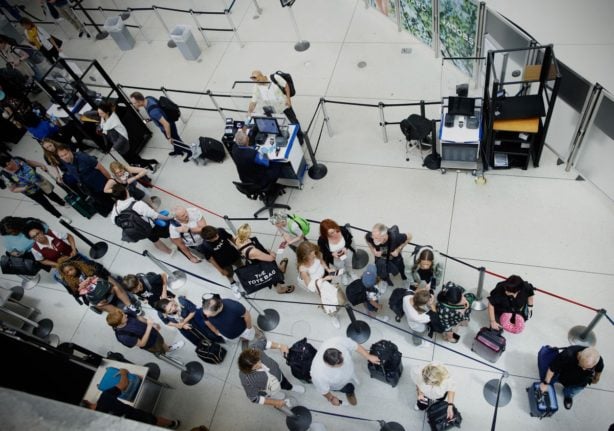Those hoping to catch an aeroplane faced long delays, cancelled flights or even the prospect of missing work as the uncertainty left them feeling “helpless”.
At Sydney Airport, where the outage made check-in impossible, travellers milled around as they waited for information, with many unsure of whether their flights would leave.
Wearing a neck chain and a beanie, 29-year-old Alexander Ropicano was hoping to finally return to his girlfriend in Brisbane, around 900 kilometres (559 miles) away.
READ ALSO: European travel services hit by major global IT glitch
“I haven’t seen her in a while,” he sighed dejectedly, complaining that he was left “in limbo” by not knowing if his flight would take off.
“If it was cancelled, it’d be easier. I’d go to Qantas or Virgin and book a new flight,” he said.
“But the fact that it’s not cancelled makes it more confusing, because I don’t know what’s going on.”
Tallulah Kennedy was likewise faced with a bureaucratic nightmare after learning that her flight would not get off the ground.
“I tried to call Jetstar as well to reschedule my flight, but they said I couldn’t reschedule it because I was already checked-in,” the 30-year-old said.
READ MORE: Global IT glitch starts to cause travel chaos in Spain
‘We feel stuck’
Passengers elsewhere in the world were forced into playing the waiting game, especially in the northern hemisphere where summer holiday season is in full swing.
After taking off from Paris Charles De Gaulle airport at 7:00 am, an Air France plane bound for Berlin returned to its point of departure after a 45-minute flight, an AFP journalist reported.
Aboard was 22-year-old student Anja Mueller, who had been hoping to return home after a week-long holiday in France.
“We’re struggling to find another train or flight, and our other option is to sleep at the airport,” she said.
In the German capital, 47-year-old musician Kirk McDowell faced an anxious wait in the early afternoon.
He was expected to perform in Bordeaux, in the south of France, at 8:30 pm.
Both his initial flight and a second trip he booked to replace it were cancelled, but he still hoped to make the stage on time.
“Now my friend is trying to book a private flight with another friend,” he said, admitting to being drained by the ordeal.
Halfway across the world in Washington, Evyn Garson was faced with a dilemma.
The 38-year-old was meant to go to a wedding in Florida with her husband and two young children.
“We feel kind of stuck,” she said, in two minds about whether to hop in a car and tackle the 1,450-kilometre trip by road.
“We definitely considered just driving down there. But now it looks like they are checking bags so we might stay,” she said.
Further up the East Coast in New York, 56-year-old psychologist Cristina Vaccaro had just learnt that she would have to postpone her flight from LaGuardia Airport until the next day.
“It’s really frightening that something so big can happen,” she told AFP, confessing to feeling “helpless”.
Old-fashioned methods
Airport staff have been forced into returning to old-fashioned methods to help flights take off.
Seoul’s Incheon Airport resorted to carrying out check-in by hand, with huge queues developing as a result.
In Budapest Airport in Hungary, staff made up for the blank display screens at the check-in counters by calling out the names of destinations themselves.
It is not just air travellers affected by the blackout, with trains and online banking services also struggling.
In the United Kingdom and the Netherlands, even hospitals were affected by the IT failure.
Supermarket shoppers had to contend with out-of-service payment terminals, with one Waitrose in the southern English town of Petersfield reverting to the days where cash was king.
Not everyone has let the computer crash bring them down, though, with social media awash with memes and jokes making light of the outage.
Many featured Microsoft’s dreaded “blue screen of death” fatal error message, which has become a fixture on countless displays across the planet.
For more detailed country specific information, head to the homepage for The Local France, Germany, Spain, Italy, Austria, Switzerland, Sweden, Norway or Denmark.



 Please whitelist us to continue reading.
Please whitelist us to continue reading.
Member comments